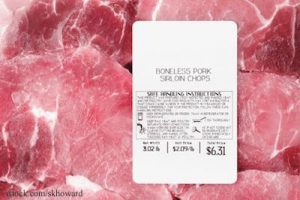Four groups joined together to file court papers last week for permission to defend mandatory Country of Origin Labeling (COOL) from a “spurious lawsuit” brought by the meatpacking industry. R-CALF USA, Food & Water Watch, the South Dakota Stockgrowers Association, and the Western Organization of Resource Councils petitioned the court to let them defend the labeling law. COOL requires muscle cuts of beef, pork, lamb, and goat meat to display where the animal was born, raised, and slaughtered and prohibits the “commingled” mixed-origin label. Those labels allowed meat produced completely in the U.S. to carry a label such as “Product of Mexico, USA.”
 Country of Origin Labeling has been a contentious issue and has been the subject of several lawsuits in the past few years. The American Meat Institute and eight other groups sued in U.S. District Court last month to overturn the law and filed an injection against enforcement of the rule while the lawsuit is pending. Those groups say that COOL violates the right to free speech by compelling speech.
Country of Origin Labeling has been a contentious issue and has been the subject of several lawsuits in the past few years. The American Meat Institute and eight other groups sued in U.S. District Court last month to overturn the law and filed an injection against enforcement of the rule while the lawsuit is pending. Those groups say that COOL violates the right to free speech by compelling speech.
Food & Water Watch Director Wenonah Hauter said, “the meatpackers are demanding a first amendment right to deceive consumers by insisting on vague and misleading labels that do not let consumers choose all-American beef, pork, and lamb products. Consumers overwhelmingly support, use, and deserve Country of Origin Labeling because they want to know the source of the food they are feeding their families.”
South Dakota Stockgrowers Association Executive Director Silvia Christen said in a statement, “our interest is in preserving COOL for generations to come. The COOL regulation that requires the meat labels to list each country where livestock was born, raised, and harvested benefits U.S. cattle and sheep producers who can differentiate and promote American born and raised livestock in an increasingly international supermarket meat case.”
R-CALF USA CEO Bill Bullard said, “marketplace competition can no longer occur without COOL. In this global market, more imports from more countries are entering the U.S. each year and foreign meatpackers are trying to capture market share away from U.S. family farmers and ranchers. COOL allows U.S. cattle farmers and ranchers to highlight their product to U.S. consumers, whom we believe will choose our exclusively U.S. produced product if they can identify it in the market.”




